| Listing 1 - 5 of 5 |
Sort by
|
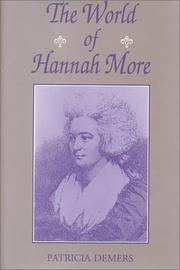
ISBN: 0813148200 9780813148205 0813119782 0813131286 Year: 1996 Publisher: Lexington, Kentucky University Press of Kentucky
Abstract | Keywords | Export | Availability | Bookmark
 Loading...
Loading...Choose an application
- Reference Manager
- EndNote
- RefWorks (Direct export to RefWorks)
History has not been kind to Hannah More. This once lionized writer and activist -- the most influential female philanthropist of her day -- is now considered by many to be the embodiment of pious morality and reactionary anti-feminism. Largely because of her belief in separate spheres for men and women, More has been vilified by modern-day feminists. The first biography to examine the complete range of her life and work, The World of Hannah More depicts the author as a forceful voice in her own day and one who, from the point of view of plain justice, today deserves a more nuanced treatment.
Women educators --- Authors, English --- Women and literature --- Educators --- Biography. --- History --- More, Hannah, --- Chip, Will, --- One of the laity, --- Author of Percy, --- Percy, Author of, --- Moore, Hannah, --- Z.,
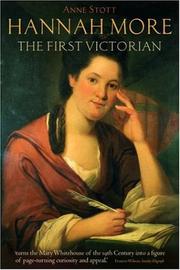
ISBN: 0199245320 Year: 2003 Publisher: Oxford Oxford university press
Abstract | Keywords | Export | Availability | Bookmark
 Loading...
Loading...Choose an application
- Reference Manager
- EndNote
- RefWorks (Direct export to RefWorks)
#BIBC:ruil
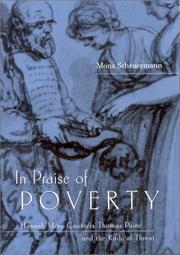
ISBN: 0813159679 9780813159676 1322597537 9781322597539 0813122228 9780813122229 081319394X Year: 2015 Publisher: Lexington The University Press of Kentucky
Abstract | Keywords | Export | Availability | Bookmark
 Loading...
Loading...Choose an application
- Reference Manager
- EndNote
- RefWorks (Direct export to RefWorks)
In her own time and in ours, Hannah More (1745-1833) has been seen as a benefactress of the poor, writing and working selflessly to their benefit. Mona Scheuermann argues, however, that More's agenda was not simply to help the poor but to control them, for the upper classes in late eighteenth-century England were terrified that the poor would rise in revolt against Church and King.As much social history as literary study, In Praise of Poverty shows that More's writing to the poor specifically is intended to counter the perceived rabble rousing of Thomas Paine and other radicals active in the
Poor --- Poverty --- Radicalism --- Conservatism --- Conservativism --- Neo-conservatism --- New Right --- Right (Political science) --- Political science --- Sociology --- Destitution --- Wealth --- Basic needs --- Begging --- Subsistence economy --- History --- Paine, Thomas, --- More, Hannah, --- Chip, Will, --- One of the laity, --- Author of Percy, --- Percy, Author of, --- Moore, Hannah, --- Z., --- Political and social views.
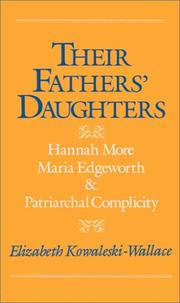
ISBN: 1280440848 1423734742 0195345029 1602566127 9781423734741 9780195345025 9781602566125 9780195068535 019506853X 019506853X 0197726526 Year: 1991 Publisher: New York, N.Y. Oxford University Press
Abstract | Keywords | Export | Availability | Bookmark
 Loading...
Loading...Choose an application
- Reference Manager
- EndNote
- RefWorks (Direct export to RefWorks)
Through an examination of the lives and selected works of two 18th-century writers, this study attempts to discover why these women identified so strongly with their fathers, whose conservative, patriarchal views advocated the repression of democracy and freedom of speech.
English fiction --- Women and literature --- Fathers and daughters in literature. --- Patriarchy in literature. --- Literature --- History and criticism. --- History. --- Women authors --- More, Hannah, --- Edgeworth, Maria, --- Edgeworth, --- Author of Practical education, --- Practical education, Author of, --- Author of Letters for literary ladies, --- Letters for literary ladies, Author of, --- Edgeworth, Eliza, --- Chip, Will, --- One of the laity, --- Author of Percy, --- Percy, Author of, --- Moore, Hannah, --- Z., --- Political and social views. --- Thematology --- Psychological study of literature --- English literature --- More, Hannah --- Edgeworth, Maria
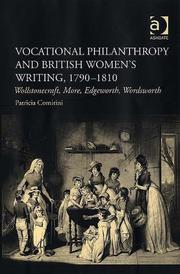
Abstract | Keywords | Export | Availability | Bookmark
 Loading...
Loading...Choose an application
- Reference Manager
- EndNote
- RefWorks (Direct export to RefWorks)
Filantropie in de literatuur --- Humanitarianism in literature --- Philanthropie dans la littérature --- Charities --- English prose literature --- Literature and society --- Women and literature --- Literature --- Literature and sociology --- Society and literature --- Sociology and literature --- Sociolinguistics --- English literature --- Women authors&delete& --- History and criticism --- Social aspects --- Edgeworth, Maria, --- More, Hannah, --- Shelley, Mary Wollstonecraft, --- Wordsworth, Dorothy, --- Chip, Will, --- One of the laity, --- Author of Percy, --- Percy, Author of, --- Moore, Hannah, --- Z., --- Criticism and interpretation. --- Diaries. --- Shelley, Mary Wollstonecraft --- More, Hannah --- Criticism and interpretation --- Wordsworth, Dorothy --- Diaries --- Edgeworth, Maria --- Women authors --- 18th century --- 19th century --- Great Britain
| Listing 1 - 5 of 5 |
Sort by
|

 Search
Search Feedback
Feedback About UniCat
About UniCat  Help
Help News
News